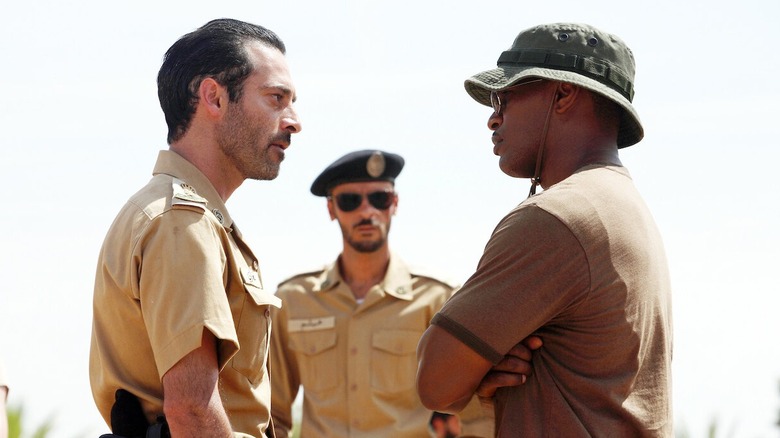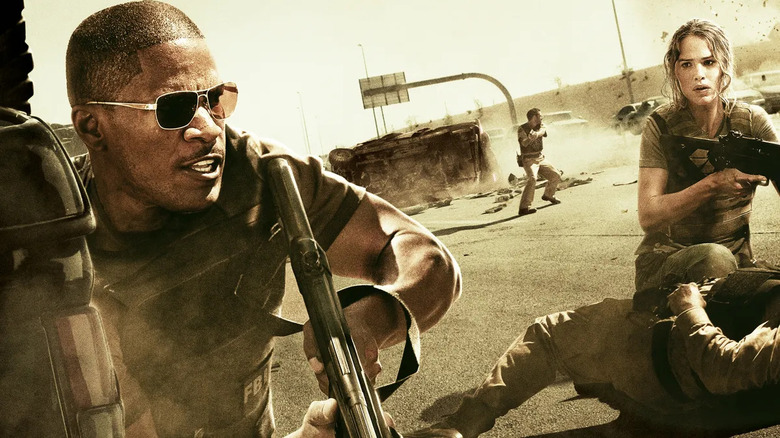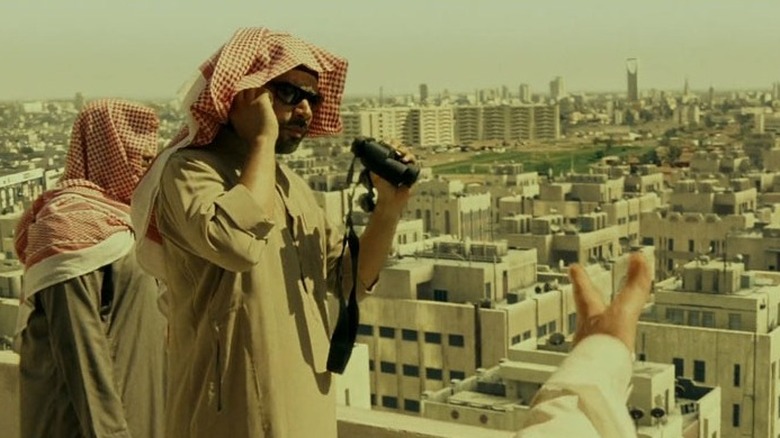The Kingdom Offers A Provocative Perspective On Extreme Patriotism In Netflix's Top 10
Peter Berg's "The Kingdom" was added to Netflix's library in June 2023 and with only a week into the month, it reached the site's Top 10 most-watched offerings. Released in 2007, "The Kingdom" earned middling reviews and an unimpressive box office take. Like several other films, it has found a new audience via streaming — which is surprising, since it's very much a film of its time.
"The Kingdom" refers to the Kingdom of Saudi Arabia, where most of the film is set. The film's opening is half title sequence, half newsreel, covering the history of Saudi Arabia from its founding in 1932 up to the then-present day. The country's oil reserves mean its history is intertwined with that of the world's largest oil consumer: the United States.
The film then cuts to a fenced community of American oil workers living in Saudi Arabia. Al-Qaeda terrorists infiltrate the compound, gunning down several residents and suicide bombing others. One of the casualties is FBI agent Francis Manner (Kyle Chandler), so a four-person FBI team led by Ron Fleury (Jamie Foxx) is given permission to investigate the site of the attack and help capture the culprits. Their liaison is Colonel Faris Al-Ghazi (Ashraf Barhom) of the Saudi State Police.
These events are loosely based on the 1996 bombing of Saudi Arabia's Khobar Towers, which American agents were deployed to investigate. However, aside from this seed of truth, the story is otherwise fictionalized — though it does seek to use fiction as commentary on reality.
The allegory
Despite its setting, "The Kingdom" is really about the Iraq War and the War on Terror. Think about the set-up — American citizens are massacred so U.S. forces go to the Middle East to find the attack's mastermind and avenge the fallen. The aforementioned title sequence even concludes with a recap of the 9/11 attacks and an explanation for why they happened (15 of the 19 hijackers were Saudis).
By 2007, it was clear the U.S. invasion of Iraq was a failure, so "The Kingdom" reads as both an attempt to reflect on that failure and provide faux-catharsis. At the time "The Kingdom" was shot and released, Osama bin Laden hadn't been caught and killed yet. Fleury's team, though, gets their man: Al Qaeda commander Abu Hamza (Hezi Saddik).
In the last 30 minutes, when the leads are ambushed by Hamza's men and have to fight their way through a city, the film goes from a procedural to a survival thriller. During this sequence, Peter Berg uses a shaky cam and rapid cutting. The action isn't indecipherable but it's sometimes too kinetic for its own good. All the while, I mostly felt like rewatching producer Michael Mann's magnum opus, "Heat."
The attack that kicks off "The Kingdom" may take place on Saudi soil, but it purposefully evokes images of American suburbia — the residents are even playing and watching a baseball game when the violence erupts. This has the ugly connotation of evil brown people destroying idyllic Americana.
What the ending means
Several contemporary critics pointed to this in 2007. Scott Tobias, writing for The A.V. Club, called "The Kingdom" "dangerously cathartic" and felt the film failed to thread its political needle. Though Colonel Al-Ghazi is consistently sympathetic, some have pointed to this as simple tokenism. In a Guardian op-ed pointedly titled, "One Good Arab," Sharif Nashashibi wrote:
"'The Kingdom' perpetuates negative stereotypes for a quick buck and an adrenaline rush, at a time in the world where breeding such ignorance and prejudice has proven catastrophic."
The one thing that calls into question the jingoism is the ending — it's oddly non-triumphant and belongs in a more thoughtful movie. Fleury admits that after the attack, he comforted Agent Mayes (Jennifer Garner) by promising they would kill all those responsible. In a cross-cut, it turns out the dying Hamza made that same promise to his grandson. With this ending, the film takes a step back and acknowledges violence is a cycle spun by revenge, leaving no party innocent.
Unfortunately, Peter Berg has regressed as a filmmaker since. He continues to direct "based-on-a-true-story" films, but they lack even the occasional thoughtfulness of "The Kingdom." "Lone Survivor," based on Operation Red Wings, is straight-up U.S. military propaganda in spite of that, true to the title, only one of the leads survives. "Deepwater Horizon" and "Patriots Day" both turn real-life tragedies into Mark Wahlberg's hero fantasies. Berg continually filming stories with Muslims as the bad guys also vindicate the harsher readings of "The Kingdom."
Maybe the takeaway from the ending of "The Kingdom" should have been to stop making, or watching, movies like this.


